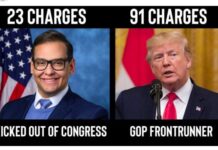“…10% of American college students thought that TV’s Judge Judy was a member of the U.S. Supreme Court.”
One of the few strong points of the Trump presidency is that voters believe he can manage the economy better than his Democratic challenger, Joe Biden. While this is debatable, the question hinges on what constitutes “the economy.”
Is it the stock market, employment rates, GDP growth, fiscal policies, including the national debt, tax rates, or entitlement programs?
To most Americans, the economy is what they see every day. This includes changes in their 401(k)s, mortgage rates, and ability to have a good job that pays the bills.
But to wealthier Americans, the economy includes rising markets, inflation controls, beneficial tax rates, including low estate taxes, investment regulation, and the ability to transfer money between nations.
“The economy” has several definitions depending on your income level, but studies have shown that most Americans are not very financially literate. This creates problems in household financial management, especially the inability to evaluate expensive financial products and loan alternatives.
Financial Literacy Problems
As part of the Dodd-Frank Act, the SEC has been charged to “identify the existing level of financial literacy among retail investors as well as methods and efforts to increase (it).” Part 1 of the SEC Financial Literacy Study was released recently, but the horses left the barn long ago.
Not surprisingly, the study finds (based on research done since 2006) that “investors do not understand the most elementary financial concepts, such as compound interest and inflation…diversification or the differences between stocks and bonds…are not fully aware of investment costs and their impact on investment returns… and lack critical knowledge of ways to avoid investment fraud.”
Political Literacy Problems
Studies also show that Americans need financial literacy programs but are illiterate about how America’s political institutions work.
An article in the Harvard Political Review cited a 2016 survey showing that only 26% of respondents could name all three branches of government. The same article cited another study showing that 10% of American college students thought TV’s Judge Judy was a member of the U.S. Supreme Court.
The Harvard study shows that financial literacy needs to be taught along with political literacy. Healthcare reform is a great example. Healthcare policy affects every aspect of American life. It impacts employee productivity and contributes to financial stress. When public health care policy changes, it affects employees’ financial situations. This is one example of the link between teaching financial literacy and political literacy programs.
The Trump Market Illusion
As Americans struggle to understand the economy and political system, they fall prey to simple explanations about their social, economic, and political situations. This dismal understanding of the political economy and what makes Americans rich or poor allows Trump to fill in the gaps with his reality.
 Since Trump is obsessed with the stock market, he says stock market gains benefit all Americans even though only 52% have direct investments in equities, including their 401(k)s. While this is high, ownership rates vary dramatically by income and ethnicity. Americans have lower federal taxes thanks to the 2017 Tax Reform Act, but those rates will disappear after 2025.
Since Trump is obsessed with the stock market, he says stock market gains benefit all Americans even though only 52% have direct investments in equities, including their 401(k)s. While this is high, ownership rates vary dramatically by income and ethnicity. Americans have lower federal taxes thanks to the 2017 Tax Reform Act, but those rates will disappear after 2025.
In this Act, more than 60% of the tax savings went to people in the top 20% of the income, according to the Tax Policy Center. Predictably, the Republican tax bill also cut the corporate tax rate by 40%. Corporations get to keep those rates indefinitely, while the wealthiest Americans still enjoy tax loopholes that have allowed them to not pay billions in taxes over the past years.
The U.S. Treasury Inspector General for Tax Administration shows that hundreds of thousands of the country’s highest earners have not been paying taxes. The report found that 879,415 high-income citizens had not filed returns, amounting to $45.7 billion in lost tax revenue, and that the Internal Revenue Service has not managed to look into most of these cases”, according to the Organized Crime and Corruption Reporting Project.
So, What’s the “Real Economy”?
So, what is the actual definition of “the economy”?
In an election year, the “real economy” means how much money you have in the bank. It also includes your employment prospects. Will you have a job in six months? What do you do when your unemployment benefits expire? What are your job prospects looking a year or two into the future?
Those determine the average American’s real economy. It is much more than the volatile returns of the stock market. It is about the American standard of living, social stability, and quality of life for the next five or ten years. That is the objective measure of the economy.











